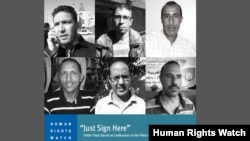LONDON —
Courts in Morocco are convicting defendants based on confessions that the accused say were obtained by torture or were falsified by police, a Human Rights Watch (HRW) report said Friday.
One man told Human Rights Watch how he had been refused access to a lawyer and was told he would be beaten to death if he did not sign a confession.
He says his body could not take any more torture and so he told them: “If you want me just to sign, here is my signature.”
The report examines five trials carried out between 2009 and 2013 - 77 cases were heard in total - that included protestors, Western Sahara activists and people accused of plotting terrorism.
Tamara Alrifai from Human Rights Watch says many defendants allege their confessions had been obtained through ill-treatment while in detention.
“We are talking about the people who are arrested not being informed why they are arrested, not being able to inform their family that they are arrested, and also not having immediate access to a lawyer as stipulated by the Moroccan law. We are also talking about psychological and physical ill-treatment,” Alrifai said.
Moroccan authorities say they have made moves to reform their judiciary.
But Alrifai says the Human Rights Watch investigation shows that judges ignore complaints made by the defendants over alleged ill treatment.
“We are also seeing a judiciary, a set of judges, that do not even question allegations given to them during the procedures. So they just blindly follow the reports that come with the defendants from the police stations, which are often erroneous or are accusations extracted under torture,” Alrifai said.
The Human Rights Watch report makes a number of recommendations, including that people who are detained have prompt access to lawyers and that courts investigate allegations of torture.
One man told Human Rights Watch how he had been refused access to a lawyer and was told he would be beaten to death if he did not sign a confession.
He says his body could not take any more torture and so he told them: “If you want me just to sign, here is my signature.”
The report examines five trials carried out between 2009 and 2013 - 77 cases were heard in total - that included protestors, Western Sahara activists and people accused of plotting terrorism.
Tamara Alrifai from Human Rights Watch says many defendants allege their confessions had been obtained through ill-treatment while in detention.
“We are talking about the people who are arrested not being informed why they are arrested, not being able to inform their family that they are arrested, and also not having immediate access to a lawyer as stipulated by the Moroccan law. We are also talking about psychological and physical ill-treatment,” Alrifai said.
Moroccan authorities say they have made moves to reform their judiciary.
- In 2009 King Mohammed VI announced a drive to reform the judiciary.
-
In 2011, following popular demonstrations for reform, a new constitution was introduced, which included steps to strengthen judicial independence.
But Alrifai says the Human Rights Watch investigation shows that judges ignore complaints made by the defendants over alleged ill treatment.
“We are also seeing a judiciary, a set of judges, that do not even question allegations given to them during the procedures. So they just blindly follow the reports that come with the defendants from the police stations, which are often erroneous or are accusations extracted under torture,” Alrifai said.
The Human Rights Watch report makes a number of recommendations, including that people who are detained have prompt access to lawyers and that courts investigate allegations of torture.




